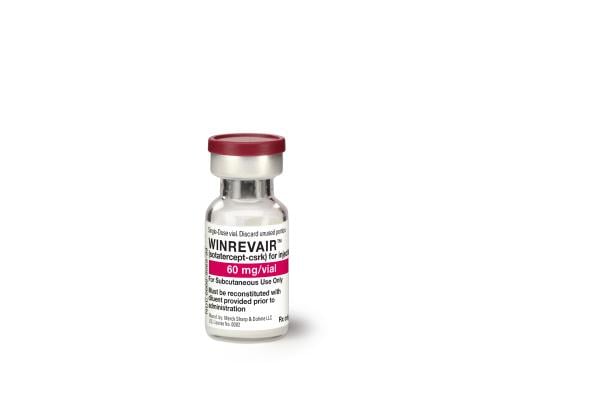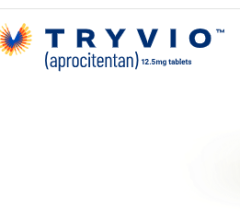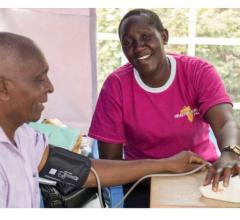
March 27, 2024 — Merck, known as MSD outside of the United States and Canada, announced that the U.S. Food and Drug Administration (FDA) has approved sotatercept-csrk (U.S. Brand Name: WINREVAIR, for injection, 45mg, 60mg) for the treatment of adults with pulmonary arterial hypertension (PAH, World Health Organization [WHO] Group 1) to increase exercise capacity, improve WHO functional class (FC), and reduce the risk of clinical worsening events. WINREVAIR was previously granted Breakthrough Therapy Designation by the FDA. WINREVAIR is the first FDA-approved activin signaling inhibitor therapy for PAH, representing a new class of therapy that works by improving the balance between pro- and anti-proliferative signaling to regulate vascular cell proliferation underlying PAH.
“Pulmonary arterial hypertension is a rare, progressive and ultimately life-threatening disease in which blood vessels in the lungs thicken and narrow, causing significant strain on the heart,” said Dr. Marc Humbert, Professor of Medicine and Director of the Pulmonary Hypertension Reference Center at the Université Paris-Saclay and investigator on the Phase 3 STELLAR study. “Based on the Phase 3 STELLAR trial, adding WINREVAIR to background PAH therapy demonstrated significant clinical benefits compared to background PAH therapy alone. This approval is an important milestone, as it offers healthcare providers a novel therapeutic option that targets a new PAH treatment pathway.”
The approval is based on the Phase 3 STELLAR trial, which compared WINREVAIR (n=163) to placebo (n=160), both in combination with background standard of care therapies in adult patients with PAH (WHO Group 1 FC II or III). Results showed adding WINREVAIR to background therapy increased six-minute walk distance from baseline by 41 meters (95% CI: 28, 54; p<0.001; placebo-adjusted) at Week 24 and significantly improved multiple important secondary outcome measures, including reducing the risk of death from any cause or PAH clinical worsening events by 84% versus background therapy alone (number of events: 9 vs 42, hazard ratio=0.16; 95% CI: 0.08, 0.35; p<0.001).
Healthcare providers should monitor hemoglobin and platelets before each dose of WINREVAIR for the first 5 doses, or longer if values are unstable, and periodically thereafter to determine if dose adjustments are required. WINREVAIR may increase hemoglobin and may lead to erythrocytosis, which if severe may increase the risk of thromboembolic events or hyperviscosity syndrome. WINREVAIR also may decrease platelet count and lead to severe thrombocytopenia, which may increase the risk of bleeding; thrombocytopenia occurred more frequently in patients also receiving prostacyclin infusion. Treatment should not be initiated if platelet count is <50,000/mm3. See additional Selected Safety Information below.
“The Pulmonary Hypertension Association welcomes the development of new therapies for those with PAH,” said Matt Granato, president and chief executive officer, Pulmonary Hypertension Association. “A diagnosis of PAH is a life-changing experience for patients and families due to its chronic, progressive nature. Patients with PAH experience limiting symptoms such as shortness of breath and fatigue. We are excited to see industry research leading to a better understanding of PAH and the development of a medicine in a novel treatment pathway that expands options for the patient community.”
“New treatment options continue to be needed for patients with pulmonary arterial hypertension that support important clinical goals, including increasing exercise capacity and improving functional class,” said Dr. Aaron Waxman, Executive Director of the Center for Pulmonary Heart Diseases at Brigham and Women’s Hospital and investigator on the Phase 3 STELLAR study. “Sotatercept added to background therapy has the potential to become a new standard of care option for patients with pulmonary arterial hypertension.”
WINREVAIR is given once every three weeks by subcutaneous injection and may be administered by appropriate patients or caregivers with guidance, training and follow-up from a healthcare provider. Healthcare providers and patients/caregivers should refer to the Instructions for Use for information on the proper preparation and administration of WINREVAIR. Merck estimates that WINREVAIR will be available for dispensing by select specialty pharmacies in the U.S. by the end of April.
“PAH remains a debilitating disease with high morbidity and mortality,” said Dr. Eliav Barr, senior vice president and head of global clinical development, chief medical officer, Merck Research Laboratories. “This approval of WINREVAIR is an important milestone and a testament to our science-led strategy and focus on the development of innovations that can help people affected by rare diseases like PAH. We are proud to bring this novel medicine to patients.”
Merck offers support to patients who are prescribed WINREVAIR, including information about insurance coverage and help for eligible patients with out-of-pocket costs and co-pay assistance options, through the Merck Access Program. For additional information, healthcare providers and patients can call 1-888-637-2502 or visit www.merckaccessprogram-WINREVAIR.com in the coming days.
STELLAR Study Results
The primary efficacy endpoint in the STELLAR trial was the change from baseline at Week 24 in 6-Minute Walk Distance (6MWD). In the WINREVAIR treatment group, the placebo-adjusted median increase in 6MWD was 41 meters (95% CI: 28, 54; p<0.001, Hodges-Lehmann estimate). Additionally, patients who added WINREVAIR had statistically significantly greater improvements compared to placebo across multiple secondary endpoints:
- Treatment with WINREVAIR led to an improvement in FC from baseline at Week 24 in 29% of patients compared to 14% of patients treated with placebo (p<0.001).
- Treatment with WINREVAIR resulted in an 84% reduction in the occurrence of death or PAH clinical worsening events compared to placebo (median duration of exposure 33.6 weeks; number of events: 9/163 vs 42/160, hazard ratio=0.16; 95% CI: 0.08, 0.35; p<0.001).
- Treatment with WINREVAIR led to an improvement from baseline in pulmonary vascular resistance (PVR). The median treatment difference in PVR between WINREVAIR and placebo was -235 dynes*sec/cm5 (95% CI: -288, -181; p<0.001).
- Treatment with WINREVAIR led to an improvement from baseline in N-terminal pro-B-type natriuretic peptide (NT-proBNP) levels. The median treatment difference in NT-proBNP between WINREVAIR and placebo was -442 pg/mL (95% CI: -574, -310; p<0.001).
About STELLAR
The STELLAR study (NCT04576988) was a global, double-blind, placebo-controlled, multicenter, parallel-group clinical trial in which 323 patients with PAH (WHO Group 1 FC II or III) were randomized 1:1 to WINREVAIR (target dose 0.7 mg/kg) (n=163) or placebo (n=160) plus stable background therapy administered subcutaneously once every 3 weeks.
The most common PAH etiologies were idiopathic PAH (59%), heritable PAH (18%), and PAH associated with connective tissue diseases (CTD) (15%). Most participants were receiving either three (61%) or two (35%) background drugs for PAH, and 40% were receiving prostacyclin infusions. The mean time from PAH diagnosis was 8.8 years. Patients had a WHO FC II (49%) or III (51%) at baseline.
About WINREVAIR (sotatercept-csrk) for injection, for subcutaneous use, 45 mg, 60 mg
WINREVAIR is FDA-approved for the treatment of adults with pulmonary arterial hypertension (PAH, WHO Group 1) to increase exercise capacity, improve WHO functional class (FC) and reduce the risk of clinical worsening events. WINREVAIR is the first activin signaling inhibitor therapy approved to treat PAH. WINREVAIR improves the balance between pro-proliferative and anti-proliferative signaling to modulate vascular proliferation. In preclinical models, WINREVAIR induced cellular changes that were associated with thinner vessel walls, partial reversal of right ventricular remodeling, and improved hemodynamics.
WINREVAIR is the subject of a licensing agreement with Bristol Myers Squibb.
Selected Safety Information
WINREVAIR may increase hemoglobin and may lead to erythrocytosis. Severe erythrocytosis may increase the risk of thromboembolic events or hyperviscosity syndrome. Monitor Hgb before each dose for the first 5 doses, or longer if values are unstable, and periodically thereafter, to determine if dose adjustments are required.
WINREVAIR may decrease platelet count and lead to severe thrombocytopenia, which may increase the risk of bleeding; thrombocytopenia occurred more frequently in patients also receiving prostacyclin infusion. Do not initiate treatment if platelet count is <50,000/mm3. Monitor platelets before each dose for the first 5 doses, or longer if values are unstable, and periodically thereafter to determine if dose adjustments are required.
In clinical studies, serious bleeding (e.g., gastrointestinal, intracranial hemorrhage)
was reported in 4% of patients taking WINREVAIR and 1% of patients taking placebo. Serious bleeding was more likely in patients on prostacyclin background therapy and/or antithrombotic agents, or with low platelet counts. Advise patients about signs and symptoms of blood loss. Do not administer WINREVAIR if the patient is experiencing serious bleeding.
WINREVAIR may cause fetal harm when administered to a pregnant woman. Advise pregnant women of the potential risk to a fetus. Advise females of reproductive potential to use an effective method of contraception during treatment with WINREVAIR and for at least 4 months after the final dose. Pregnancy testing is recommended for females of reproductive potential before starting WINREVAIR treatment.
Based on findings in animals, WINREVAIR may impair female and male fertility. Advise patients on the potential effects on fertility.
The most common adverse reactions occurring in the Phase 3 clinical trial (≥10% for WINREVAIR and at least 5% more than placebo) were headache (24.5% vs 17.5%), epistaxis (22.1% vs 1.9%), rash (20.2% vs 8.1%), telangiectasia (16.6% vs 4.4%), diarrhea (15.3% vs 10.0%), dizziness (14.7% vs 6.2%), and erythema (13.5% vs 3.1%).
Because of the potential for serious adverse reactions in the breastfed child, advise patients that breastfeeding is not recommended during treatment with WINREVAIR, and for 4 months after the final dose.
For more information: www.merck.com


 September 09, 2025
September 09, 2025 









